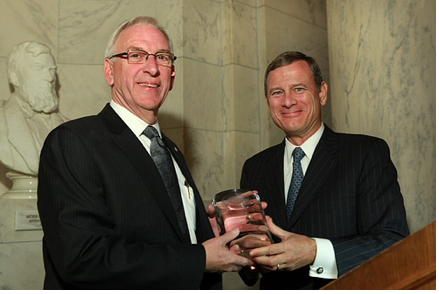[Continued from last week]
On Nov. 15th, Chief Justice of the United States John G. Roberts Jr. presented the 2012 William H. Rehnquist Award for Judicial Excellence, to Judge John Surbeck during a ceremony at the U.S. Supreme Court in Washington, D.C.
I had the opportunity to talk to Judge Surbeck recently about his Reentry Court.
Judge Surbeck expressed great satisfaction at the personal honor bestowed upon him and his Court. He said that he also felt the award was given in appreciation of the Reentry Court field, as well as all the work done by collaborative and problem solving courts and their practitioners across the nation.
The Allen County Reentry Court has grown into a substantial reentry court system, working with over two hundred and fifty former prisoners. It has expanded from a relatively modest program based on offenders getting out of prison two to four months early, to a program that also uses split sentencing as an important part of his program. As Judge Surbeck explained, Indiana courts have the jurisdiction to split a prison sentence, enabling an offender to serve part of their sentence in prison and part in the community under probation supervision.
Judge Surbeck also envisions the possibility of using “Front End Reentry” to return offenders from prison within one year of their prison sentence, for re-sentencing in Reentry Court and a local disposition, including probation supervision (under an Indiana statute that gives judges the necessary discretion).
Judge Surbeck and the Allen County Reentry Court are clearly leading the way, showing the nation how a systemic approach to returning state prisoners can as Judge Surbeck puts it, “reduce recidivism and increase public safety”.


